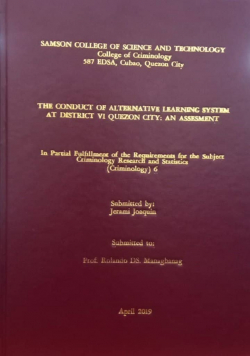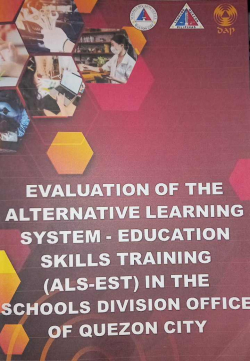The conduct of Alternative Learning System at district VI Quezon City: An assessment

Type
Other
Authors
Joaquin ( Jerami )
Category
Alternative Learning System
[ Browse Items ]
Publication Year
2019
Pages
47 pages
Abstract
The Alternative Learning System is a parallel learning system in the Philippines that provides a practical option to the existing formal instruction.
When one does not have or cannot access formal education Alternative Learning System is an alternative or substitute. It includes both the non-formal sources of knowledge and skills, and only requires learners to attend learning sessions based on the agreed schedule between the learners and the facilitators.
The program has two different schematics in conducting instruction: school-based and community-based. School-based is being conducted in school campuses and community-based. School-based is being conducted in school campuses while the community-based program conducted in community barangay halls or in private places. The Alternative Learning System is a program which follows a uniform lesson module for all academics subjects covering Sciences, Mathematics, English, Filipino Social Studies, Current Events among others. Delivery of instructions are provided by government-paid instructors or by private/non-government organization.
Aside from schematic instruction the program has two levels: elementary and secondary. Students have to start from elementary level, then proceed to high school level. If a student is a graduate of elementary under a formal classroom system, the student is automatically admitted to secondary education depending on which year level the student year level.
To improve the socio-economic status of the (OSY) Out of School Youth and the poor by enhancing their basic education capability through functional educational and literacy, and continuing education programs, which will enable them to become more self-reliant, be integrated more effectively into the social and economic enhancement and self-growth opportunities.
The promotion of literacy programs for the attainment of basic skills that include numeracy and functional literacy which are basic needs on every individual.
The development of livelihood skills which manifest in the individual specific competencies prepare, improve, and enhance employability and economic productivity.
The expansion of certification and equivalency programs, which are administered by the formal education subsystem, into the non-formal sector,
When one does not have or cannot access formal education Alternative Learning System is an alternative or substitute. It includes both the non-formal sources of knowledge and skills, and only requires learners to attend learning sessions based on the agreed schedule between the learners and the facilitators.
The program has two different schematics in conducting instruction: school-based and community-based. School-based is being conducted in school campuses and community-based. School-based is being conducted in school campuses while the community-based program conducted in community barangay halls or in private places. The Alternative Learning System is a program which follows a uniform lesson module for all academics subjects covering Sciences, Mathematics, English, Filipino Social Studies, Current Events among others. Delivery of instructions are provided by government-paid instructors or by private/non-government organization.
Aside from schematic instruction the program has two levels: elementary and secondary. Students have to start from elementary level, then proceed to high school level. If a student is a graduate of elementary under a formal classroom system, the student is automatically admitted to secondary education depending on which year level the student year level.
To improve the socio-economic status of the (OSY) Out of School Youth and the poor by enhancing their basic education capability through functional educational and literacy, and continuing education programs, which will enable them to become more self-reliant, be integrated more effectively into the social and economic enhancement and self-growth opportunities.
The promotion of literacy programs for the attainment of basic skills that include numeracy and functional literacy which are basic needs on every individual.
The development of livelihood skills which manifest in the individual specific competencies prepare, improve, and enhance employability and economic productivity.
The expansion of certification and equivalency programs, which are administered by the formal education subsystem, into the non-formal sector,
Description
47 pages : illustrations, portrait ; 21 cm x 29.7 cm.
Research - (Bachelor of Science in Criminology) Samson College of Science and Technology, 2019
Research - (Bachelor of Science in Criminology) Samson College of Science and Technology, 2019
Biblio Notes
includes bibliography and indices.
Number of Copies
1
| Library | Accession No | Call No | Copy No | Edition | Location | Availability |
|---|---|---|---|---|---|---|
| Learning Resource Management Section Library | 653 | R 616.85 J62 2019 | 1 | Yes |

